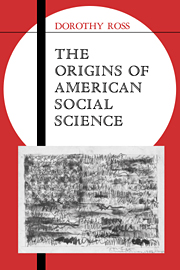Book contents
- Frontmatter
- Contents
- Acknowledgments
- Abbreviations used in the footnotes
- Introduction
- Part I European social science in antebellum America
- Part II The crisis of American exceptionalism, 1865–1896
- Part III Progressive social science, 1896–1914
- Part IV American social science as the study of natural process, 1908–1929
- Epilogue
- Bibliographical note
- Indexes
- Ideas in Context
Introduction
Published online by Cambridge University Press: 23 September 2009
- Frontmatter
- Contents
- Acknowledgments
- Abbreviations used in the footnotes
- Introduction
- Part I European social science in antebellum America
- Part II The crisis of American exceptionalism, 1865–1896
- Part III Progressive social science, 1896–1914
- Part IV American social science as the study of natural process, 1908–1929
- Epilogue
- Bibliographical note
- Indexes
- Ideas in Context
Summary
American social science bears the distinctive mark of its national origin. Like pragmatism or Protestant fundamentalism or abstract expressionism, social science is a characteristic product of modern American culture. Its liberal values, practical bent, shallow historical vision, and technocratic confidence are recognizable features of twentieth-century America. To foreign and domestic critics, these characteristics make American social science ahistorical and scientistic, lacking in appreciation of historical difference and complexity. To its supporters, the drive for scientific method, freedom from the vagaries of history, and practical utility in American society have been praiseworthy goals marred by too-frequent lapses, but they have been equally singled out as its characteristic features. What is so marked about American social science is the degree to which it is modeled on the natural rather than the historical sciences and imbedded in the classical ideology of liberal individualism.
The distinctive character of American social science has necessarily had a profound effect on social practice and social thought in the United States. A historical world is a humanly created one. It is composed of people, institutions, practices, and languages that are created by the circumstances of human experience and sustained by structures of power. History can be used to achieve a critical understanding of historical experience and allows us to change the social structures that shape it. In contrast, the models of the social world that have dominated American social science in the twentieth century invite us to look through history to a presumably natural process beneath.
- Type
- Chapter
- Information
- The Origins of American Social Science , pp. xiii - xxiiPublisher: Cambridge University PressPrint publication year: 1990

